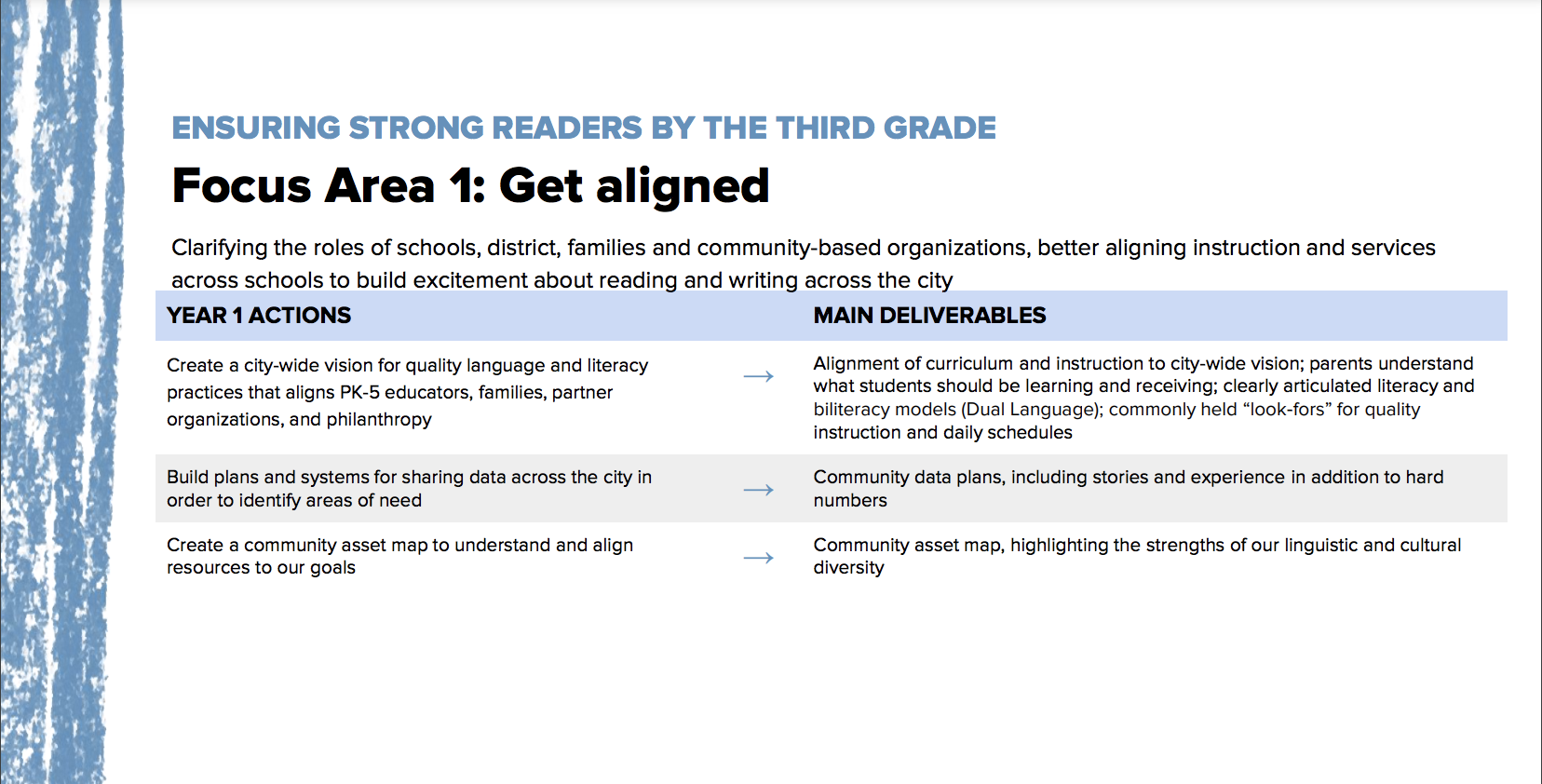Blog
OUSD Strategic Plan Blog Series #1: Getting Focused and Aligned
Share
Finding Focus
On June 30, the Oakland School Board voted to adopt the OUSD 2021-24 Strategic Plan. In the coming weeks, the OLC will publish a series of blog posts as OUSD moves into Year 1 implementation. In this series, the OLC will focus on Initiative #1: Ensuring Strong Readers by the Third Grade and its corresponding focus areas:
- Focus Area 1: Get Aligned
- Focus Area 2: Put Families in the Driver’s Seat
- Focus Area 3: Invest in our Educators
- Focus Area 4: Use Data Make the Best Decisions
In our blog series, we’ll break down each focus area and identify ways for community members to get involved and take action. We start this series with Focus Area 1: Get Aligned.
As you become familiar with these focus areas, we ask that our community think about how we all individually and collectively might leverage our capacities and resources to meet these goals. As Oakland’s hub for literacy, the OLC will assist members, OUSD, and the greater community to synchronize all of our efforts by providing opportunities to explore and determine effective ways to take action.
As Superintendent Kyla Johnson-Tramell noted in presentations to the board, the plan is a “living document.” Hence, we ask our community to consider how each initiative might be improved, refined, and possibly redirected as we move into implementation.
Achieving Alignment
OUSD is clear in the strategic plan that they can’t achieve this goal alone. Schools, community partners, and families have to be working together to remove barriers, increase opportunity, and build excitement for reading and writing across the city.
Ideally, alignment will involve the careful coordination and leveraging of each stakeholder group’s capacities and resources. Hence, what resources do community-based organizations bring to meeting this goal? What can our families do to contribute to this effort? How are the individual activities and actions that we take helping to meet our larger goal? These are questions we should repeatedly ask ourselves as the plan is implemented.
The OLC brings members together to understand the services that the other organizations across the field provide. We provide spaces for members to further develop their own programming through the collaboration with other member organizations to best serve Oakland students. In other words, we work to help member organizations align their services.
With adoption of the new strategic plan, a roadmap has been set to guide the alignment process and the OLC will continue to help facilitate this work between our member organizations, OUSD, and our broader community.
The Year 1 actions and main deliverables for Focus Area 1 are as follows:
Year 1 deliverables will play a key role in advancing a shared vision and aligned approach for early literacy.
As part of the effort to develop a “city-wide vision for quality literacy and language practices”, the OLC will be holding the first annual Oakland Literacy Symposium – Literacy and Justice for All. We encourage all community stakeholders to join us (virtually) on Oct. 1-2 to deepen understanding of literacy in Oakland. We also hope that the Symposium provides a space for our community to continue engaging in the process of alignment.
Additionally, the Oakland NAACP’s Administrative Petition to OUSD, co-sponsored by the OLC, outlines key demands to ensure alignment of curriculum and instruction to a citywide vision of reading achievement and will be a continued focus of advocacy.
By establishing a Community Data Plan, we will be able to frequently assess the implementation of the plan in a systematic fashion and adjust practices as dictated by the data. A Community Data plan will also help ensure transparency and accountability of the District’s efforts in achieving the goal of the initiative.
By developing a Community Asset Map, we will establish a stronger understanding of how to best leverage the existing resources and capacity of our community members in reaching the initiative’s goals. The OLC has offered OUSD our digital Litmap as a model or possibly a starting point for this effort.
How to take action?
Parents & Families
In the effort to align to a city-wide vision, we encourage parents and families to consult with their teachers and principals to determine ways in which they can best support their children at home. OUSD recently established and mailed information to families that outline academic milestones for students, which the OLC helped to develop. Parents can collaborate with school staff to implement practices specific to their children at home that will help to achieve these milestones.
Community Partners & Members
At a minimum, we ask that community partner organizations be willing to share data and information necessary for the Data Plan and Asset Map. Community members can also contribute by assisting in the collection of data and information once plans for these efforts have been developed. The District will invite members to actively participate in the design and planning of these efforts. Community members will also have the opportunity to participate in decisions on how to best utilize information collected.
Together, achieving these deliverables will be essential to create alignment necessary for a strong and sustainable culture of reading.




